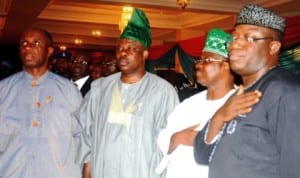Business
60% Of Edo Drivers’ Licence, Fake – FRSC

Governor Chibuike Rotimi Amaechi of Rivers State (left), with some APC governors, during a lecture in Ibadan recently.
The Edo Sector Commander of the Federal Road Safety Corps, Mr Luka Ikpi, last Wednesday said that over 60 per cent of drivers’ licence used in the state was counterfeit.
Ikpi said this in Benin during a sensitisation meeting on the proposed enforcement of the use of the New Vehicle Number Plates across the country, with effect from July 2014.
The sensitisation meeting was held with the Edo State Board of Internal Revenue in Benin.
The commander said that the high rate of the use of fake driving licence and vehicle plate numbers in the state was alarming.
He, however, stated that stricter measures were being put in place to curtail the trend.
“During our road patrols and vehicles checks, we discovered that most drivers’ licences and plate numbers used in the state are fake ones.
“We usually seize such licence and plate numbers and offenders are persecuted but we are taking a step further to prosecute insurers of such fake documents.
“This is not just a safety issue but also a security offence and a deficit to the state government revenue,” Ikpi said.
He said that efforts were being put in place to establish additional five Driving Licence Centres in the state to meet the demand.
The Executive Chairman of the Edo Board of Internal Revenue, Chief Oseni Elamah, while receiving the delegates from FRSC in his office, commended the efforts of the corps in the reduction of auto-crashes in the country.
Elamah said his board would collaborate with the FRSC to reduce the production and issuance of fake driving licences and vehicle number plates in the state.
“We will continue to ensure that number plates are not sold off the shelves across the state and that the basic data are captured before the issuance of such documents.
“The issuance of fake driving licence, sales of fake number plates and sales of other states’ number plates in the state, are challenges we face.
“We want to ensure that we block all the loopholes where these fake number plates come about.
“We have started an operation where old number plates are retrieved and returned back to the FRSC to prevent re –use.” Elamah said.
In his speech, the Corps Commander, Mr Peter Osawe, Head of the National Drivers’ Licence Department, FRSC Abuja, commended the revenue board on its prompt remittance of funds to the corps.
He said that Edo was one of the few states that are not indebted to the corps.
Osawe said that enlightenment campaigns were ongoing across the country on the need to key into the use of the new vehicle number plates before July 1, 2014.
Reacting to the issue of fake driving licence, he said that banks would be empowered to arrest customers who presented fake driving licence for business transactions.
He urged members of the public to ensure that they gave complete information and that their biometrics were taken before being issued a driving licence or number plate.
Business
NCDMB, Dangote Refinery Unveil JTC On Deepening Local Content
Business
Food Security: NDDC Pays Counterpart Fund For LIFE-ND Project
Business
Replace Nipa Palms With Mangroove In Ogoni, Group Urges FG, HYPREP
-
News4 days ago
Police Rescue Kidnapped Victim As Suspects Escape With Gunshots in Rivers
-
Politics4 days ago
Your Lies Chasing Investors From Nigeria, Omokri Slams Obi
-
Opinion4 days ago
Get Rid Of Wastes In PH
-
Business4 days ago
NCDMB, Dangote Refinery Unveil JTC On Deepening Local Content
-
Business4 days ago
Replace Nipa Palms With Mangroove In Ogoni, Group Urges FG, HYPREP
-
News4 days ago
Demonstrate Commitment In Improving Host Communities, Ibas Tells Corps Members
-

 Politics4 days ago
Politics4 days agoTinubu’s Contribution To Buhari’s Presidency Marginal – Ex-SGF
-
Opinion4 days ago
How Reliable Is AI

